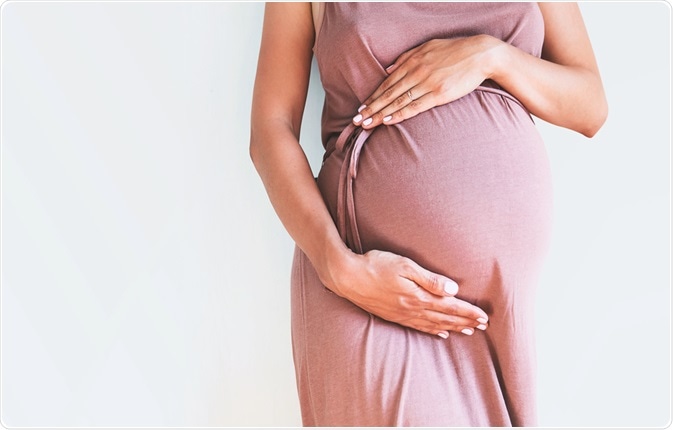What does it mean to eat for two? Well, it might be easier to explain what it is not. It does not mean eating twice as much. However, it includes eating a properly planned nutritious diet that gives a pregnant woman more protein, iron, calcium and folic acid than before pregnancy.

Image Credit: Natalia Deriabina/Shutterstock.com
The food eaten by a pregnant woman is the primary source of nutrition for the developing fetus, and therefore sensible meals made from healthy and easily digestible ingredients are the best way to keep both the woman and her growing baby healthy during pregnancy.
How much weight gain is safe in pregnancy?
According to expert guidelines, women who have a healthy body weight at conception may expect to gain 25-30 pounds. Underweight women should gain up to 10 pounds more, while overweight women should gain up to 5 pounds or less. Obese women should gain only up to 20 pounds.
The pattern of weight gain is significant. During the first trimester, the mother should gain about 2-4 pounds, increasing to 3-4 pounds per month after this period.
Gaining excessive weight could increase the chances of diabetes in pregnancy, make the baby too heavy and reduce the chances of normal delivery, and predispose the mother and infant to future obesity, diabetes, and hypertension.
Calories in pregnancy
Pregnancy typically demands an increase in calorie needs, about 300 calories more per day at least for the second and third trimesters. However, these extra calories should come from nutritious food and not empty calories like those from soft drinks, candies or rich desserts.
If a woman becomes malnourished during pregnancy this can affect the baby causing it to be born with shorter stature or lower cognitive performance. Malnourishment also increasing the risk of a wide range of future health conditions including a reduction in lung, kidney or immune system function.
Vitamins and minerals
Iron, zinc, selenium, and calcium are just a few of the important minerals that need to be taken in adequately increased amounts in pregnancy for a healthy mother and baby.
Vitamins such as folic acid for the prevention of neural tube defects, B12 and A, are also important during this time. A good prenatal mineral and vitamin supplement will help provide these at adequate doses.
Unsafe foods
While a pregnant woman can eat almost anything she could before, some things must be avoided. Moreover, proper handwashing after touching soil, raw meat or fish, or raw produce, is important to avoid foodborne illness. Produce must be well washed before eating.
Unsafe foods in pregnancy include smoked seafood, deli meats, unpasteurized dairy (milk or milk products) and soft cheeses like Brie or Camembert, readymade salads, several types of sea fish (swordfish, king mackerel, tilefish, shark), more than two servings (12 ounces) of low-mercury cooked fish (shellfish, canned light tuna, salmon, pollock, cod, catfish, tilapia) any type of raw sprouts, and herbal therapies.
Unripe papaya and pineapple may be harmful. Foods with supplementary DHA/EPA may compensate if fish is cut out of the diet altogether.
Drink your water
The blood volume in pregnancy begins to increase quite early and goes up to almost 150% of its original volume. This means the mother must drink a lot of water too. This helps to ease constipation, prevent hemorrhoids and urinary tract infections and may prevent preterm labor too.
If the mother is very active or lives in a hot region, more water is needed. The fluid intake should be around 10 cups daily, including water, juice, tea and coffee, and soft drinks. However, water is always the best and safest drink. Coffee may supply too much caffeine, and soft drinks give empty calories, without any accompanying nutrients.
Alcohol and caffeine
Alcohol is to be avoided throughout pregnancy for fear of fetal alcohol syndrome, which is a complex birth defect associated with alcohol intake.
Caffeine intake should be limited to less than 200 mg a day, the amount usually found in 12 ounces of coffee. Caffeine may be linked to preterm birth but the evidence is not solid.
What about food cravings?
Food cravings in pregnancy are famous and should usually be acted upon as the mother’s body may have a different way of dealing with nutrients compared to the non-pregnant body.
However, nonfood items like clay, starch, and ice could be harmful and a craving for these is called pica. Pica should be reported to the doctor and investigated.
What are Kegel exercises?
The pelvic floor is a sheet of tough muscle slung between the bones of the pelvis, that supports the entire weight of the abdominal and pelvic organs. Strengthening these muscles helps improve the odds of normal delivery and better recovery after childbirth. Strong pelvic muscles also help prevent urinary and rectal incontinence.
Kegel’s exercises consist of tightening these muscles for a few seconds at a time, for 10-15 reps, several times a day.
They can be located by either squeezing the muscles used to stop the flow of urine or by squeezing a finger inserted into the vaginal opening. It is important not to stop urination too many times – once the muscles are located it should be a simple matter to contract them at will.
Eating well is one of the chief ways to keep healthy during pregnancy, and may prevent many fetal defects, prevent emotional problems and help ensure a successful recovery after delivery.
Further Reading
Last Updated: Apr 14, 2020